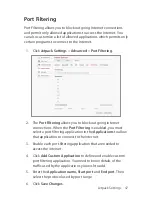
Glossary 61
•
Port Forwarding
— A process that allows remote devices to
connect to a specific computer within a private LAN.
•
Port Number
— A 16-bit number used by the TCP and UDP
protocols to direct traffic on a TCP/IP host. Certain port
numbers are standard for common applications.
•
Protocol
— A standard that enables connection,
communication, and data transfer between computing
endpoints.
•
Proxy
— A firewall mechanism that replaces the IP address
of a host on the internal (protected) network with its own IP
address for all traffic passing through it.
•
Router
— A device that directs traffic from one network to
another.
•
SIM
— Subscriber Identification Module. Found in LTE and
GSM network technology, the SIM is a card containing
identification information for the subscriber and their account.
The SIM card can be moved to different devices.
•
SSID
— Service Set IDentifier. The name assigned to a Wi-Fi
network.
•
TCP/IP
— Transmission Control Protocol/Internet Protocol. The
set of communications protocols used for the Internet and
other similar networks.
•
USB
— Universal Serial Bus. A connection type for computing
device peripherals such as a printer, mobile modem, etc. USB
connectors may be used for data transfer or charging.
















































